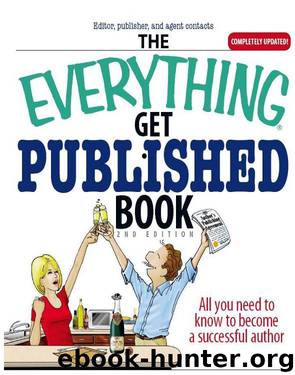The Everything Get Published Book by Meg Schneider & Barbara Doyen

Author:Meg Schneider & Barbara Doyen
Language: eng
Format: epub
Tags: ebook, book
Publisher: Adams Media, an imprint of Simon & Schuster, Inc.
Published: 2006-07-15T00:00:00+00:00
The use of plagiarism detection software isn’t limited to academia any more. High-profile plagiarism cases have created increased demand for commercial programs like iThenticate to compare, in minute detail, writing from literally billions of digitally stored sources. These programs can find suspicious similarities even in short phrases and are now regularly used in business, law, and, of course, publishing.
Talk to Your Editor
When a question of plagiarism arises, the first thing your editor will do is contact you (or your agent, if you have one) to discuss it. It’s a serious issue, and even minor lifting of a phrase or two has been enough, in some cases, to suspend publication of the work. However, regardless of the extent of the problem, it is essential that you talk it over with your editor.
Sometimes, especially if the problem is minor and it happened inadvertently, you’ll be asked to fix the text. Publication usually will go forward, as long as you can alter the text to suit the publisher. In these cases, the writer is essentially given a second chance to make good—a rare occurrence in publishing these days, when competition is stiffer than ever and there is a virtually unlimited supply of talented writers just waiting for an opportunity to prove themselves. If you find yourself in this situation, count your blessings and be as gracious and cooperative as you know how to be in fixing the problem. If the mistake happened through carelessness or inattention, explain it to your editor and have a plan in place to prevent such errors in the future. Aside from resolving the immediate issue, the most important thing an editor will need from you is a firm assurance that it won’t happen again.
Plagiarism does sometimes happen inadvertently. Alex Haley omitted to give proper credit for a paragraph in his masterpiece Roots ; he or a research assistant had failed to make a proper notation about the source of the passage, so there was no way to know it wasn’t his own work when it came time to insert it in his text.
Refine Your Tracking Methods
Except for magazine and newspaper writing, direct quotes from other sources are frowned upon in commercial publishing. If you do want to use direct quotes, make sure your notes are clear so you can make the proper attribution. You may find it helpful even to note which ideas and phrases are your own by marking them with a large “Me” in the margin. And, as an extra precaution, get into the habit of double-checking your phrasing as you write; this can help you avoid accidentally presenting as your own a phrase or sentence that you remember from your research.
Download
This site does not store any files on its server. We only index and link to content provided by other sites. Please contact the content providers to delete copyright contents if any and email us, we'll remove relevant links or contents immediately.
Asking the Right Questions: A Guide to Critical Thinking by M. Neil Browne & Stuart M. Keeley(5756)
Autoboyography by Christina Lauren(5226)
Eat That Frog! by Brian Tracy(4522)
Dialogue by Robert McKee(4386)
Sticky Fingers by Joe Hagan(4188)
Journeys Out of the Body by Robert Monroe(3615)
Annapurna by Maurice Herzog(3464)
Full Circle by Michael Palin(3443)
Schaum's Quick Guide to Writing Great Short Stories by Margaret Lucke(3371)
Elements of Style 2017 by Richard De A'Morelli(3339)
The Art of Dramatic Writing: Its Basis in the Creative Interpretation of Human Motives by Egri Lajos(3058)
Atlas Obscura by Joshua Foer(2952)
Why I Write by George Orwell(2944)
The Diviners by Libba Bray(2927)
The Fight by Norman Mailer(2926)
In Patagonia by Bruce Chatwin(2919)
The Mental Game of Writing: How to Overcome Obstacles, Stay Creative and Productive, and Free Your Mind for Success by James Scott Bell(2897)
Venice by Jan Morris(2568)
The Elements of Style by William Strunk and E. B. White(2470)
